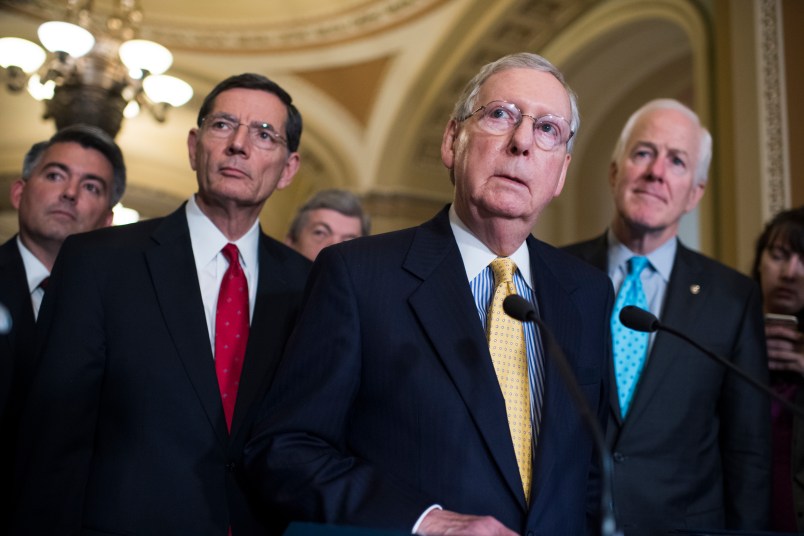Senate Republicans released Thursday a revised version of its Obamacare repeal legislation, the Better Care Reconciliation Act. The tweaks to the bill come after the first version failed to get the 50 Republican votes needed to pass, and Majority Leader Mitch McConnell (R-KY) was forced to delay his plans to push the legislation through before the July 4 recess.
GOP leadership is hoping for a Congressional Budget Office score early next week, and an initial procedural vote to advance the legislation after that.
GOP senators weren’t expecting major changes to the initial draft, beyond the question of whether they’ll include a proposal from Sen. Ted Cruz (R-TX) to let insurers sell unregulated plans alongside Obamacare-compliant plans.
The language in the bill released Thursday allows for Obamacare’s tax credits for individual insurance to be used on “catastrophic plans” that cover at least three primary care visits.
A section of the revised bill, placed in brackets, sets aside $70 billion for insurers to subsidize high-risk individuals, presumably those would most likely to see their premiums rise under a proposal being pushed by Sen. Ted Cruz to let insurers sell unregulated plans. To qualify, insurers must sell a gold, silver and benchmark plan, under the new language. If they did, they could also sell policies that do not comply with Obamacare’s essential health benefits, its protections for pre-existing conditions and its ban on waiting periods.
“The brackets mean that the policy continues to be worked upon as members react to it,” a senior senate policy staffer told reporters. “This is the first time that all members in our conference are taking a look at the language and they will likely have additional recommendations and thoughts for Senator Cruz and sponsors of the amendment to review.”
Health policy experts, the insurance industry and even some Republicans have warned that such a system would destabilize the market as healthy people flock to the stingy plans, leaving sick people in the comprehensives plans where they’d see their premiums skyrocket unless they received additional assistance.
Like the original draft, the new version repeals many of Obamacare’s taxes on the health care industry. But the legislation has been revised to keep the ACA taxes on net investments and a Medicare payroll tax for high earners. It also gets rids of a tax break the initial draft had for insurance executives.
Already, some key Republican swing votes were raising concerns that the new version would not to do enough to soften the bill’s massive cuts to Medicaid.
Like the initial draft, the process by which Medicaid expansion would be phased would still begin in 2021, when the enhanced match rate would start being reduced until it is drawn down to the traditional Medicaid match rate in 2024. The larger program is, again, turned into a capped system in which the limits on the per-enrollee funding from the federal government rises more slowly than the program has typically grown, with a more draconian inflation metric imposed in 2025. Block grants are also available to the states, and the revised bill allows expansion states to include their expansion populations to be counted when tabulating the block grant.
A more generous formula for uncompensated care is also being used in the new version.
There is new language letting states apply for waivers for community-based care within their Medicaid programs. A provision to allow states to deal with public health emergencies outside of the caps has also been added.
The revised bill also includes $45 billion in funding for opioid programs, up from $2 billion in the initial draft.
The language was released as GOP senators huddled with Majority Leader Mitch McConnell to go over the changes. After the closed-door meeting, McConnell took to the Senate floor to defend the revised bill.
“After extensive consultations across the conference, numerous meetings with constituents and intensive conversation with members, our conference has updated last month’s Better Care discussion draft with additional provisions to make it stronger,” he said.
Read the legislation below:







Better Care Reconciliation Act
Riiiiiight.
The whole purpose of the “Repeal and Replace” bill is a massive cut to Medicaid that can be delivered as a tax cut to the Republican donor class. If the cut remains in the bill or even if it is delayed a little, millions will lose health care. Grandmas across the country will be kicked out of nursing homes.
McConnell will say to the tenth or hundredth of 1%:
“Look how hard we tried!”
Folks, for safety’s sake we’d better keep up the pressure, but…
This POS, still laced with legislative IEDs and giving not “half” but a hemisemidemi loaf to both sides, was designed to fail.
So now, without saying so directly, the Conservatives can give a little bit of the blame to the “”"|beginquote|Centrists""", and vice versa.
But most of the blame goes guess where.
Good luck with that, MeYotch.
Edit:I’m still looking for an eventual last-minute retraction on the vote to avoid putting any of these cowards on record in favor of the bill.
So, the subsidy would cover junk. ins. plans that also offer a visit to the Doctor to get your blood pressure taken (Which you could do right now at a CVS pharmacy).
EDIT TO ADD: And for THIS they’re staying in DC two extra weeks?? Christ on a cinder block, might as well go home already.
If the bill contains steep Medicaid cuts, let’s hope it dies next week. Anyone know what it does on Medicaid?